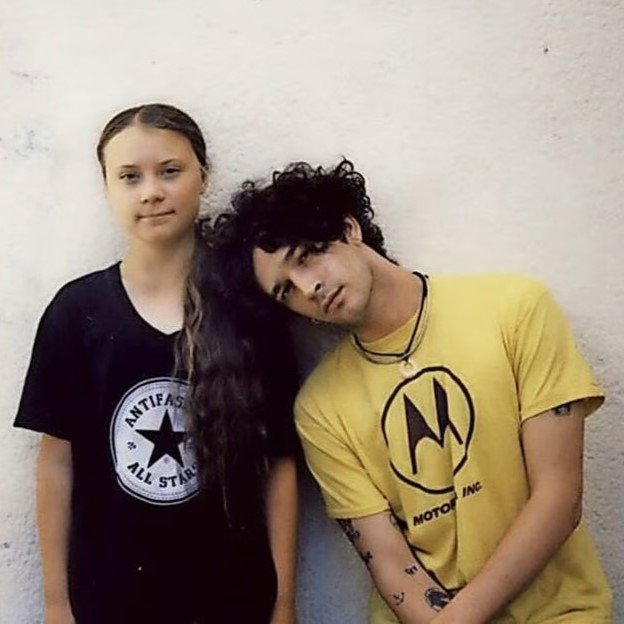Matty Healy is Gonna Save the Planet, But Kill Me in the Process
British pop band The 1975 start every album with a song titled “The 1975.” In their own words, the songs serve as a status update for the band. Lead singer Matty Healy made a statement featured on Spotify Storyline: “I really wanted each of our albums to be a distillation of the one that preceded. The first track on the album is always our opportunity to express this idea as immediately as possible.” Ironically, the majority of “The 1975” songs are the same song. In attempts to better understand the egomaniacal, pretentious mind of Matty Healy, I have taken it upon myself to evaluate and review every “The 1975” song in chronological order.
Starting in 2013 with the group’s first self-titled album, the album begins with its titular track, “The 1975.” Clearly, they know their branding. The song is a little over a minute with a singular long verse. The lyrics are mostly abstract words: “Go down / Soft sound / Midnight / Car lights” but eventually do seem to imply some reflection on a relationship. The song is meant to be incredibly meta. As Matty Healy describes it, “I saw the record like that [meta], it felt quite self-involved, not in an egocentric way, more like a journal or a diary entry.” While I disagree with the egocentric aspect, conceptually the song is more interesting than meets the eye. The track is inspired by the ‘starting up’ sounds in the mold of brands such as Playstation, Xbox, and Windows. Healy writes, “I loved the way these brands had sounds that reintroduce themselves every time their devices are turned on.” In a clever way, everytime a listener plays The 1975, they are met with a reintroduction to the band and upcoming album.
The band's second album, released in 2016, unsurprisingly begins with the exact same song. The album’s name is I like it when you sleep, for you are so beautiful yet so unaware of it, which is objectively a garbage title for an album and makes me want to vomit. However, the song is slightly more exciting as it takes out Matty Healy’s voice and replaces it with the sound of many layered voices. Moving away from the initial self-centered album, ILIWYS strategically utilizes this chorus to indicate this shift to a more collaborative effort.
In 2017, the band released their live performance in London. Starting with “The 1975” version from ILIWYS, the crowd goes wild to the recording. Not the most exciting interpretation, but I could understand how this classic song for The 1975 works better live among thousands of people, then at home with your headphones; A strong way of opening up the concert and getting the crowd excited.
In 2018, the band’s initial idea was to get rid of the opening “The 1975” song. The band was dedicated to opening A Brief Inquiry Into Online Relationships with a song titled “The Anxiety Music.” However, after trying for months, they never got the song right. Two days before the record was supposed to be delivered, Matty Healy sat down at the piano and put together a version of the song for ABIIOR. Fun fact: you can tell. The song has the exact same melody and lyrics as the previous two, but this time features voice-alteration that makes Healy sound robotic. I suspect this was a play on the concept of ‘online relationships,’ but unfortunately it makes me absolutely hate this version. It’s often been speculated whether Matty Healy needs autotune or if autotune needs him. In this instance, I wish the two never met.
The opening song on 2020’s Notes On A Conditional Form has to be, in my opinion, the funniest “The 1975” of them all. Instead of the traditional lyrics and melody, the song “The 1975” is a five-minute monologue given by Greta Thunberg, set to an emotional instrumental. There is nothing inherently wrong with this choice. However, it does appear like Healy has just in 2020 realized that climate change is a real problem and has taken it on himself to personally save the planet along with his new sidekick Greta Thunberg. At best this is a political statement, at worst it is straight up pretentious. In actuality, it’s just a strange choice.
In the band’s most recent album Being Funny in A Foreign Language, “The 1975” serves once again as an update for the band, trying to capture their contemporary identity. But for the first time, the song is a new, full-length track that reflects on both the next decade and Healy’s past behavior. In my opinion, this song is not only the best of these “The 1975” adaptations, but also one the band's best songs in general. The song begins as a summary of current culture: screwed body images, desensitization from technology, etc. It then moves on to a reflection on Healy’s past with lyrics such as “I'm sorry about my twenties, I was learnin' the ropes / I had a tendency of thinking 'bout it after I spoke.” Known for his controversial past of addiction and acting out of control, Healy is directly apologizing to the fans who have stuck with him, and addressing more recent actions. His brand has now become defined by his past; he knows he has to exploit that in order to stay relevant, hence the line “You're makin' an aesthetic out of not doing well / And minin' all the bits of you you think you can sell.” The song finally concludes as an apology to the younger generation. Healy, who knows far too well the confusion and insecurities of growing up, apologizes to those who are currently coming of age. He repeats until the end of the song, “I’m sorry if you’re living and you’re seventeen.” This version, while a complete diversion from the original “The 1975” template, is the most lyrically interesting and effective take on Healy’s initial concept.
On their next record, will the band return to the original version, or create a brand-new song? Or, perhaps we’ll hear a six-minute monologue by Bill Nye.

